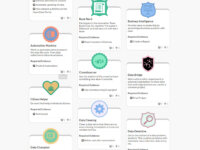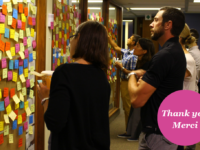The Scenario Exploration System was developed to facilitate the application of futures thinking to policy-making originally geared at engaging EU policy-makers with foresight scenarios very easily.
The tool operates as a multi-role board game that makes participants naturally grasp complex opportunities and constraints in a future-oriented perspective. Never before had a tool been able to facilitate the uptake of foresight for policy-making and systemic thinking to such an extent.
Innovation Tag: Games
Rescuebusters is an interactive 3D-animated game that specializes in youth safety education. It is an unique teaching tool that brings practical examples alongside theoretical learning with animated, real-life based tasks. Rescuebusters offers an immersive world with distinctive, sympathetic characters, unique game mechanisms and development tracking which take teaching to a whole new level.
The Louisville Metro Badge Program rewards employees for tasks like creating an open dataset, crowdsourcing information from citizens or collaborating with other departments on projects. There’s a tiered reward system for civil servants who participate, with prizes ranging from LinkedIn recommendations to recognition at a city-wide awards ceremony.
For policy makers, using indicators such as GDP, HDI or IWI is about trade-offs. What are the limitations of using these indicators, especially in a context riven by challenges related to sustainability and growth? Cantor's World, a multi-player computer-based game designed by Fields of View (FoV) and UNESCO-MGIEP, provides participants a first-hand immersive experience of the tension between economic growth and the country’s available natural and human capitals.
The Free Education platform is an open and collaborative learning space that seeks to awake the interest of Brazilian youth in their personal and professional development. It is a free, open platform, and its practical, interactive content is especially directed at lower income youths (between the ages of 16-24), that have not completed high school and do not have the necessary skills to find employment or interest in continuing their studies through formal education.
Case Study
Enhancing civic engagement in high school students through online gamification: the case of…
Brazil has faced many corruption scandals, which is causing Brazilians, and mainly its youth, to increasingly distrust public institutions in general. A a result, we launched "Cities in Play", a free online game to be played in schools that puts the students in the position of an elected mayor, who needs to choose among different public policies to make his best to succeed in his administration. Our main goal is to enable political awareness in Brazilian youth to allow them to play an active…
Rescuebusters is an interactive 3D-animated game that specialises in youth safety education. It is an unique teaching tool that brings practical examples alongside theoretical learning with animated, real-life based tasks. Rescuebusters offers a immersive world with distinctive, sympathetic characters, unique game mechanisms and development tracking which take teaching to a whole new level.
NRCan's Office of Energy Efficiency (OEE) Social Innovation UnLab (SIU) is working with program colleagues and Carrot Insights to deliver an energy efficiency rewards pilot via the Carrot Rewards mobile app. Our hypothesis: Engaging Canadians on their smartphones and gamifying learning and action will improve awareness and adoption of energy-efficient behaviours. The pilot is delivering results and entering its third phase this year (2018).
The OEE established a Social Innovation "UnLab" (SIU) to test an embedded innovation model and amplify energy efficiency policy and service impacts in Canada. The SIU creates value for energy efficiency stakeholders in three ways:
Building relationships and capacity for energy efficiency policy and service innovation;
Generating evidence and collective learning by co-creating and testing insights and interventions;
Amplifying impacts by scaling learning and implementing what works.
In order to support the operation of certified cash registers, the Financial Administration (FA) launched a crowd-sourcing campaign in 2016 for the purpose of motivating consumers to receive an invoice, take it, check whether it is correct and send it to the FA. This way, every citizen was able to contribute crack down on invoice fraud and to reduce the shadow economy (which is the part of an economy involving goods and services which are paid for in cash, and therefore not declared for tax.)





